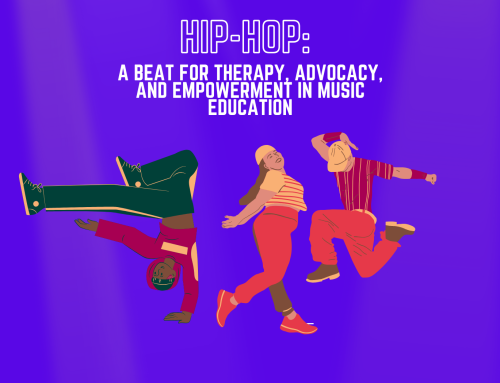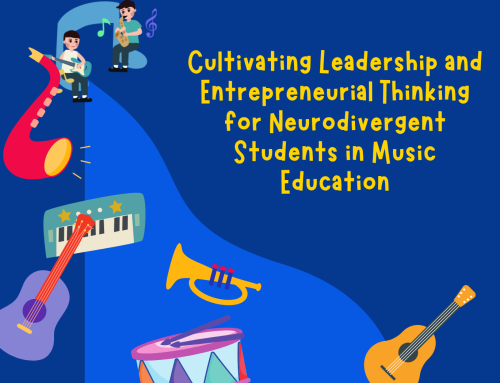I think the issue that many teachers have with music education research is that they don’t see how research has the potential to impact what they do in their classroom. That was certainly the case when I first started teaching. I would occasionally flip through some magazines, but I certainly wasn’t reading research articles. When I went to conferences, I wanted to go to the sessions that I knew would give me ideas to implement into my classroom when I got back. However, what I didn’t realize then was most music education research is conducted for the benefit of current music teachers rather than for the benefit of those in academia.
The bulk of research may be conducted by research-minded professors in higher education, but that doesn’t mean that K-12 teachers aren’t conducting research in their own ways. There are ways for research in any capacity to help teachers answer questions they may have. Basically, if you’ve ever wondered about something and then worked toward answering that question in your classroom…you’ve done research.
Action research is a great way to break into thinking about ways to improve what you teach, how you teach, and how students learn. I would even go as far as to suggest that most teachers are already doing this in their classrooms. Action research doesn’t have to be formal or fancy. It just starts with a spark of wonder or an idea.
Table of Contents
Teacher Inquiry
Mrs. Jamie Burg is a current doctoral student at the University of Florida who is also an active teacher. Her school is a developmental research school, which is a fancy way of saying that she works at a K-12 school that is frequently trying out new ideas and piloting programs. Part of her responsibilities each school year is to conduct a teacher inquiry project, which is also known as action research.
The teacher inquiry program, assisted by Dr. Nancy Dana, allows Mrs. Burg to see research as something that is very “doable.” It all starts with curiosity and wondering, identifying something to try in her classroom, and then having the support of other teachers to minimize the fear factor associated with doing research.
Informal Music Learning
When Mrs. Burg started at her school there was already a modern band class in place. Or at least a class listed as an “instrumental ensemble” that allowed students to become part of a rock band, bluegrass band, folk band, etc. with their peers in class. At the beginning of Mrs. Burg’s teaching career, this class seemed chaotic. Over time, she had seen her attitude shift completely.
Mrs. Burg slowly began to appreciate the informal learning taking place in this class and could understand why she had some preconceived notions of the informal music-making taking place. For Mrs. Burg, everything changed when she discovered the work and research of Lucy Green and began to understand that she wasn’t the only person teaching this kind of class.
What was Found?
For this particular action research project, Mrs. Burg wanted to better understand the balance her students desired between formal and informal music learning. In polling students, and based on her own observations during her class, having a 20-30 minute informal lesson or coaching once every other week seemed to be the best balance for her students. She would teach lessons on things like mic placements, amp setup, organizing cords for performances, and would even bring in musicians from around town to speak with her students.
On occasion, Mrs. Burg would coach her students in specific areas, but generally, the lessons were informal with Mrs. Burg being available to help with technique, water down parts, or suggest tips and tricks for working together more effectively. The rest of the time, her students just wanted to be left alone to explore, play, and rehearse.
So what? Why Should You Care?
During our conversation, Mrs. Burg spoke about how her class tends to look like chaos to outsiders. Mrs. Burg even mentioned that she likes to give a disclaimer to observers in her classroom, asking them to watch and see what is really happening before judging or making assumptions. She asks that administrators and others look through the chaos to identify the peer-to-peer feedback, talking through struggles, and trial and error.
Looking at and only understanding informal learning as chaos does a disservice to the actual learning taking place. Students are demonstrating autonomy. “Bad behaviors” aren’t always a student goofing around; sometimes it is a student riffing trying to figure out what they’re doing right and wrong. Really looking at what is happening helps Mrs. Burg to sift through the behaviors to spot the learning that takes place when she isn’t in front of the room teaching.
Sometimes direct instruction isn’t the answer, but being a coach is. Mrs. Burg is an experienced teacher who now says she is comfortable sitting on her hands. She did mention that it took a while to get used to taking a back seat when a student is struggling, but she is now comfortable letting things happen in class. Things that often result in learning. Sometimes she needs to be a coach helping students figure out how to practice and work out certain parts of a song, but other times, sitting back and letting students fix issues themselves is the best move.
Using Results in Other Areas
Mrs. Burg says that through her interest in informal music learning in her modern band class, she has been looking for more opportunities to bring these ideas into her large ensemble classes as well. I think the biggest takeaway I found in listening to Mrs. Burg was to embrace the “chaos” of informal learning because, in the chaos, students are learning the skills we want them to inevitably learn. Essentially, informal learning experiences foster musicians who are autonomous and don’t need a teacher present to be musical. And honestly, who doesn’t want their students to learn to become independent musicians?
Do you have research to contribute to this column? Submit with this link so that I can share what you’ve created in a future column.
More about the author of this Research
Jamie Burg is a music educator and Ph.D. student at the University of Florida. Her background experience is primarily as a band director; however, she has taught chorus, string orchestra, modern band, guitar, elementary music, and digital songwriting. If it’s related to music, she will figure out how to teach it. She also enjoys working on action research projects in her classroom and has completed action research projects about the following topics: peer-coaching in a middle school band classroom, standards-based grading philosophies applied in a performing arts classroom, utilizing master director observations to enhance your classroom, and balancing formal and informal learning in modern band. She can be reached at [email protected].




Leave A Comment